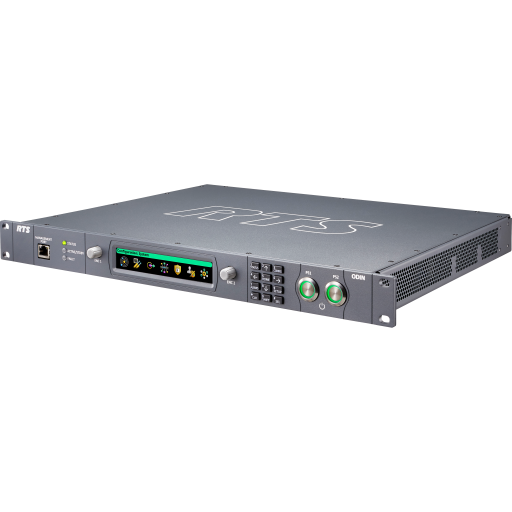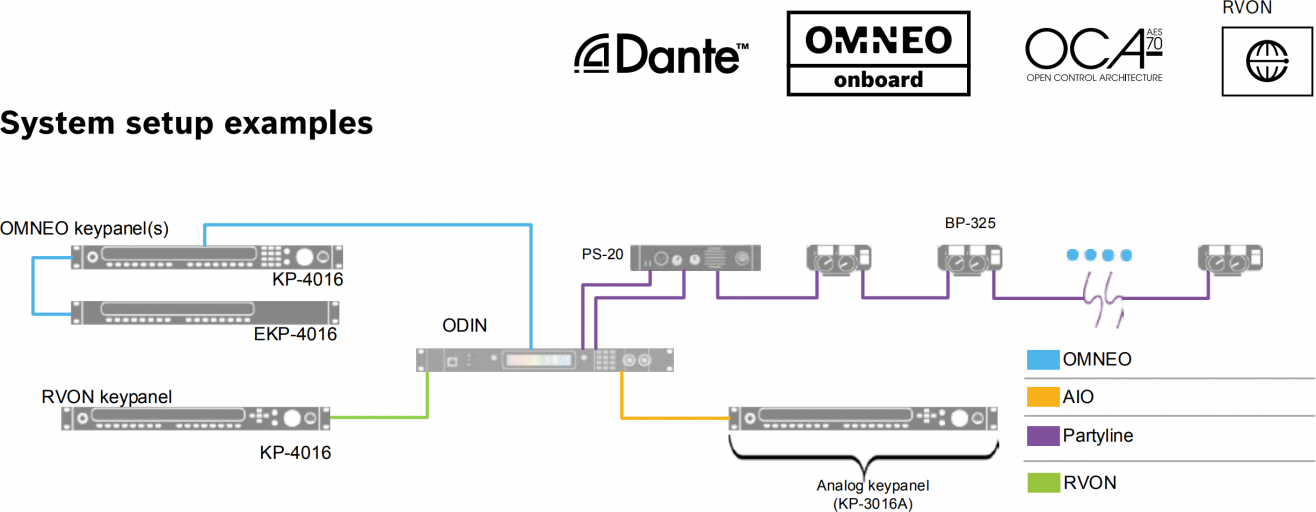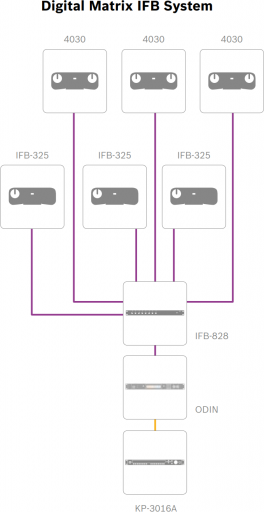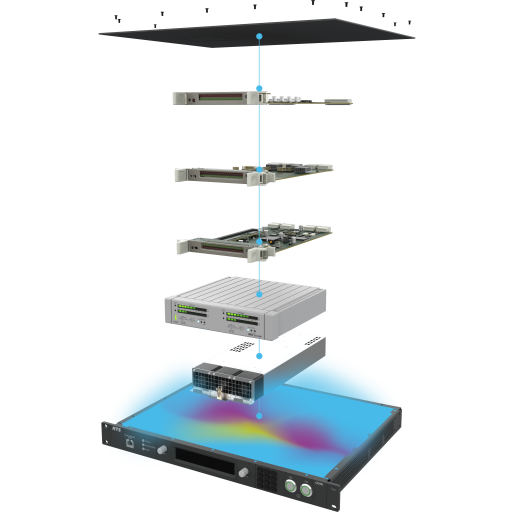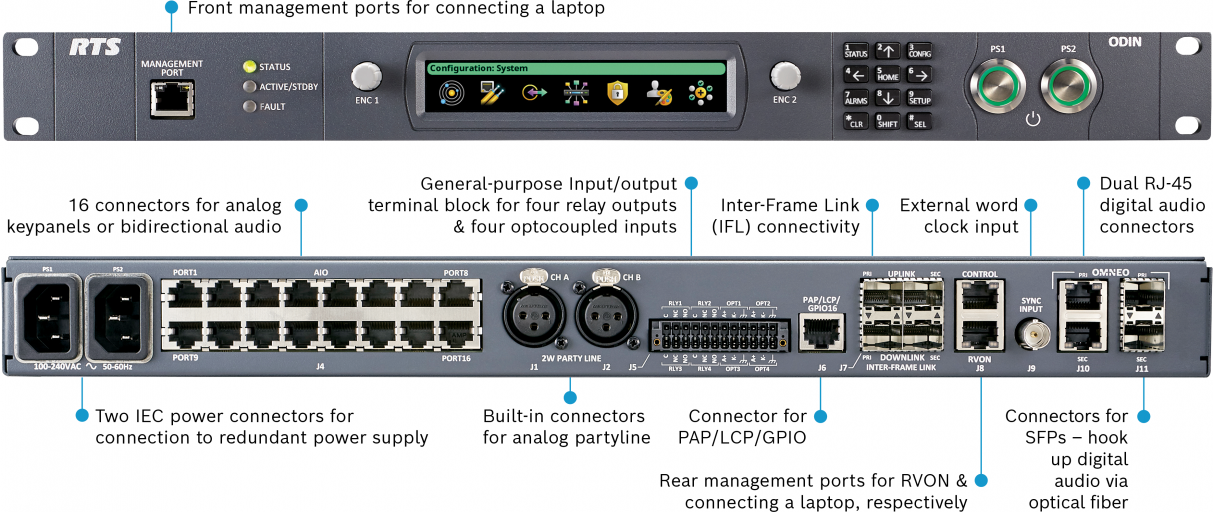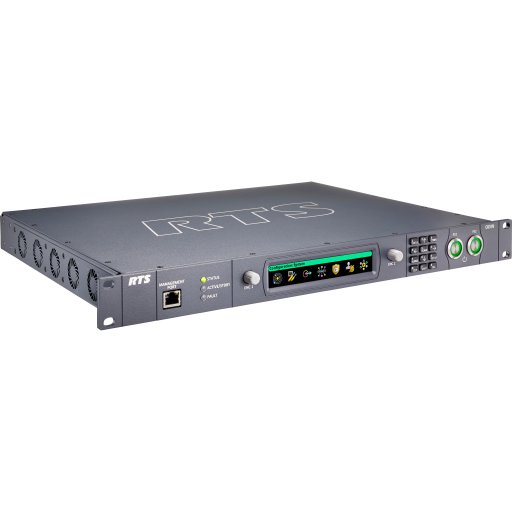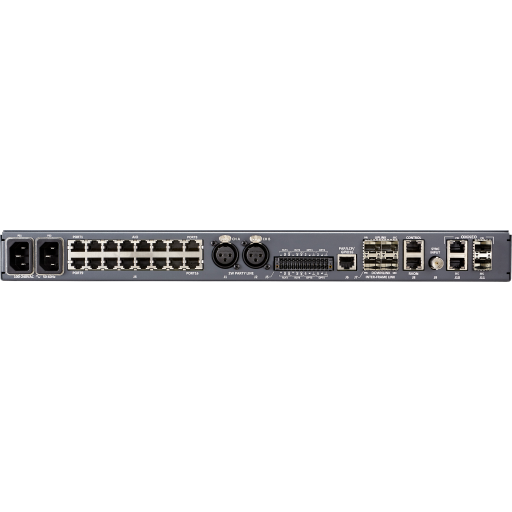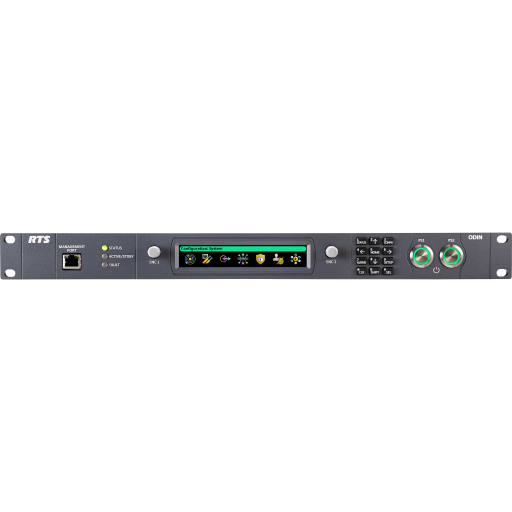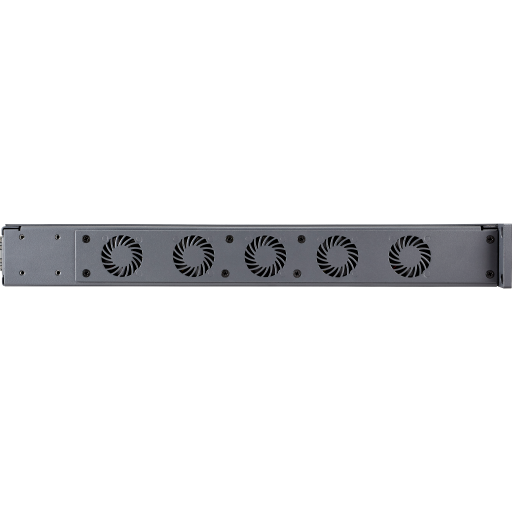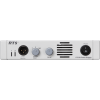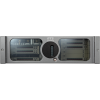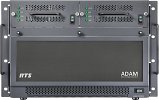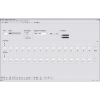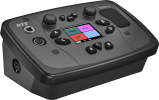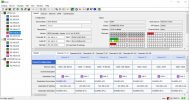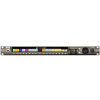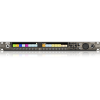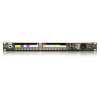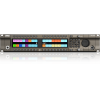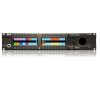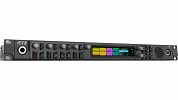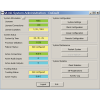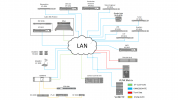ODIN
OMNEO digital intercom
- New Redundancy Options
Three flexible redundancy options are available for multiframe ODIN systems: Backup and Restore, Frame Swap and Redundant Frame Operation.
The Backup and Restore function in RTS AZedit software can be used to upload and save the complete configuration of an ODIN frame to a file, from where it can be applied to another frame. The backup includes not only the intercom setup, but also frame-specific data such as IP settings, RVON and OMNEO channel configurations, front-panel settings, port-allocation tables, etc. This option is useful when, for example, two frames in two separate OB trucks need to be linked together for a production; afterwards, each can be easily restored to their previous settings. It also allows a replacement frame to be quickly put into play if a backed-up frame needs to be removed from service.
Frame Swap is used to replace a single frame in a multi-frame ODIN intercom system. It is similar to Backup and Restore, but it is performed via the front control panel and does not involve AZedit. Instead, the replacement frame receives the intercom system configuration and frame-specific settings from another frame in the system. When the system is operating normally, frame-specific configuration is replicated across all frames. Therefore if one frame fails, the other frames already have an up-to-date copy of the failed frame’s configuration, and can make this available for Frame Swap. The replacement frame requires the purchase of an ODIN Intelligent Frame Swap license; however, the frames in the existing system do not require a license.
Redundant Frame Operation supports two modes: One-to-One Redundancy and Intelligent Redundancy. In either mode the system can be configured for automatic transfer of control (a redundant frame takes over automatically when it detects a failure) or manual transfer (a redundant frame only takes over at the direction of the user).
For One-to-One Redundancy, the customer purchases a backup ODIN frame for each core frame requiring redundancy. Redundancy options are activated and configured on the backup frame using the frame-mapping table, which can be accessed locally via the front control panel or remotely via AZedit. As no additional software license is needed, costs are frame-only.
For Intelligent Redundancy, one or more ODIN frames can be assigned as backup frames in a multi-frame system by purchasing an ODIN Redundancy Management license to support each core frame requiring redundancy. Each backup frame requires a license; core frames do not require a license. Dependent on the user’s redundancy safety preferences, a system might be configured with just one or two backup frames. For example, a 5+2 system would consist of five core frames plus two backup frames. In this case, the user would typically configure the backup frames so that each guards all five core frames.
All three modes described above require the following minimum firmware versions: ODIN v1.6.0 and AZedit v5.7.0.
- Scalable
Easily expand system as needed by adding licenses or more ODIN units: start with 16 ports and extend up to 128 ports in a single unit, or connect eight units seamlessly for a 1024-port matrix. No competing product has this level of scalability.
- Versatile
Supports Dante-compatible OMNEO IP technology*, four-wire and two-wire for the broadest connectivity to other components, all with the highest-quality audio.
- User-Friendly
High-resolution icon-based front-panel color user interface for intuitive operation and immediate configuration directly from the unit.
- Efficient
Requires less power, less space and less cooling for lower environmental impact and lower total cost of ownership.
- Flexible
Reallocate ports to any hardware type with no adapters or special boards required – future proof for evolving system with audio over IP technology and backwards compatible with legacy products.
- Glitch-free available for the most clear and reliable communication
Glitch-free is now available for the most reliable local communications. Redundancy and reliability are perhaps the most important factors when it comes to broadcast intercom. Glitch-free comms that connect team members in different locations, and often in different countries, systems that remain stable and online in the most challenging environments and working conditions.
The ODIN Digital Intercom is a highly scalable intercom system in a 1RU (Rack Unit) package. As your capacity needs to evolve, a single ODIN can grow from 16 ports to a maximum of 128 ports. A maximum of eight ODIN units can be interconnected via an optical Inter-Frame Link creating a single matrix with up to 1024 ports. The total number of licensed ports may be allocated freely to any port hardware type supported by the unit.
The front panel has been designed to incorporate a User Interface as an alternative option to AZedit that supports the most common setup and configuration tasks. The AZedit and IPedit software applications have been updated to support ODIN.
Featuring connectors for AIO, OMNEO and two-wire technology, ODIN supports keypanel technology going forward and, as always, RTS legacy keypanels. OMNEO is standard on RJ-45 connectors or is available using optional Optical Fiber SFP connectors.
Three flexible redundancy options are available for multiframe ODIN systems: Backup and Restore, Frame Swap and Redundant Frame Operation.
Learn more about redundancy options
The Backup and Restore function in RTS AZedit software can be used to upload and save the complete configuration of an ODIN frame to a file, from where it can be applied to another frame. The backup includes not only the intercom setup, but also frame-specific data such as IP settings, RVON and OMNEO channel configurations, front-panel settings, port-allocation tables, etc. This option is useful when, for example, two frames in two separate OB trucks need to be linked together for a production; afterwards, each can be easily restored to their previous settings. It also allows a replacement frame to be quickly put into play if a backed-up frame needs to be removed from service.
Frame Swap is used to replace a single frame in a multi-frame ODIN intercom system. It is similar to Backup and Restore, but it is performed via the front control panel and does not involve AZedit. Instead, the replacement frame receives the intercom system configuration and frame-specific settings from another frame in the system. When the system is operating normally, frame-specific configuration is replicated across all frames. Therefore if one frame fails, the other frames already have an up-to-date copy of the failed frame’s configuration, and can make this available for Frame Swap. The replacement frame requires the purchase of an ODIN Intelligent Frame Swap license; however, the frames in the existing system do not require a license.
Redundant Frame Operation supports two modes: One-to-One Redundancy and Intelligent Redundancy. In either mode the system can be configured for automatic transfer of control (a redundant frame takes over automatically when it detects a failure) or manual transfer (a redundant frame only takes over at the direction of the user).
For One-to-One Redundancy, the customer purchases a backup ODIN frame for each core frame requiring redundancy. Redundancy options are activated and configured on the backup frame using the frame-mapping table, which can be accessed locally via the front control panel or remotely via AZedit. As no additional software license is needed, costs are frame-only.
For Intelligent Redundancy, one or more ODIN frames can be assigned as backup frames in a multi-frame system by purchasing an ODIN Redundancy Management license to support each core frame requiring redundancy. Each backup frame requires a license; core frames do not require a license. Dependent on the user’s redundancy safety preferences, a system might be configured with just one or two backup frames. For example, a 5+2 system would consist of five core frames plus two backup frames. In this case, the user would typically configure the backup frames so that each guards all five core frames.
All three modes described above require the following minimum firmware versions: ODIN v1.6.0 and AZedit v5.7.0.
Specifications
| Power Supply: | |
| Type | Locking IE320 C14 style connector (2 connectors, fully redundant load-sharing power supplies) |
| AC Input | 100VAC – 240VAC, 60/50Hz, 0.5A / 0.35A |
| Maximum Power Consumption | 47W (based on 120VAC) Note: Lighted power buttons on front panel control DC voltage feed to internal circuitry; they do not disconnect AC from the internal power supplies. Power cords must be fully removed from unit to safely disengage internal power. |
Specifications | |
| Environmental: | |
| Operating Temperature | 32°F – 113°F (0°C – 45°C) |
| Storage Temperature | -4°F – 158°F (-20°C – 70°C) |
| Dimensions: | 19" w/ rack ears (17.3" w/o rack ears) W x 1.7" H x 14.3" D (including connectors) (482.6 mm w/ rack ears [439 mm w/o rack ears] W x 43.7 mm H x 363.5 mm D [including connectors]) |
| Weight: | |
| ODIN Matrix | 11.5lbs (5.2kg) |
| Optional Mounting Bracket | 0.86lbs (390grams) |
| AIO 4-Wire Analog: | |
| Connectors | 16 RJ-45 connectors |
| Signal Format | Differential RX/TX audio with differential RS-485 control data |
| Wiring Scheme | Both 568B & USOC supported |
| A/D and D/A Resolution | 24bits |
| Max Input Level (balanced) | +20dBu w/o clipping |
| Digital Input Gain | Programmable (-20dB – +20 dB) |
| Input Frequency Response | +1dB/-3dB from 200Hz – 20kHz |
| THD+N (8dBu input, unity gain) | 0.025% non-weighted@1kHz <0.075% non-weighted, 100Hz – 20kHz |
| Nominal Input Impedance | >22kΩ |
| Nominal Output Level | 8dBu |
| Digital Output Gain | Programmable (-20dB – 20dB) |
| Maximum Output Level (balanced) @ 600 Ohms | 20 dBu w/o clipping |
| Output Frequency Response | +1dB / -3dB from 200Hz – 20kHz |
| Output Noise Floor | <-70dBu |
| Crosstalk Isolation | >80dB |
| 2-Wire Party Line Analog: | |
| Connector | two 3-pin female XLR connectors |
| Modes/Port supported | RTS CH1, RTS CH2 Audiocom (1 channel) Clear-Com (1 channel) (Connections are DRY. NO dc voltage provided) |
| 4W/2W Echo Return Loss | >30dB |
| Unbalanced Operation (RTS/Clear-Com) | |
| Output Level | 0 dBu (nominal) |
| Expected Termination Impedance | 200 Ω |
| Noise Contribution | <-60 dBu |
| THD+N (w/ nominal input) | <0.5%, 200Hz– 8kHz |
| Bridging Impedance | >10kΩ |
| CALL Signaling | 20kHz (RTS mode) |
| 12VDC (Clear-Com mode) | |
| MIC KILL Signaling 24kHz (RTS mode) | |
| Balanced Operation (Audiocom) | |
| Ouput Level | 0 dBu (nominal) |
| Expected Termination Impedance | 300Ω |
| Noise Contribution | <-60 dBu THD+N |
| (with nominal input) | <0.5%, 200Hz – 8kHz |
| Bridging Impedance | >10 kΩ |
| CALL Signaling | 20kHz (Audiocom mode) |
| MIC KILL Signaling | 24kHz (Audiocom mode) |
| General Purpose Input/Output Ports: | |
| Relays | |
| Type | SPDT |
| Contacts | Common (C) |
| Normally Closed (NC) | |
| Normally Open (NO) | |
| Contact Rating | 1A @ 30 VDC |
| Inputs | |
| Type | Optically Coupled |
| Input Voltage | 5 VDC – 12 VDC on A+ Note: A+ is internally pulled to +5 VDC. Connect K to chassis ground to activate. |
| PAP/LCP/GPIO Port: | |
| Connector | RJ-45 |
| Format | RS-485 control data only (no audio) |
| Inter-Frame Link Port | |
| (2 UPLINK/2 DOWNLINK): Note: Supports expansion and connection of up to eight ODIN frames. | |
| Fiber Connector Type | Small Form |
| Factor Pluggable (SFP) | |
| Multimode | Finisar FTLF8519P3BNL 500m / 2.125Gbps |
| Single Mode | Finisar FTLF1421P1BTL 15km / 2.67Gbps |
| Speed | 2Gbps |
| LED Indicator | Optical Signal Present Note: SFF-8472 fiber diagnostics supported |
| Control Port: | |
| Connector | RJ-45 |
| Format | IEEE 802.3 compliant |
| Speed | 10/100/1000 Mbps |
| LEDs | Speed and Link/Activity |
| Sync Input Port: | |
| Connector | BNC |
| Termination Impedance | 75 Ω |
| Input Frequency Range | 48 kHz ±25 ppm |
| Input Level | 5V TTL |
| Compatible OMNEO Port (primary and secondary): | |
| Maximum Capacity | 128 Full-duplex ports |
| Copper Connector Type | RJ-45 |
| Format | IEEE 802.3 compliant |
| Copper Ethernet Speed | 100/1000 Mbps |
| Fiber Connector Type | Small Form Factor Pluggable (SFP) |
| Multimode | Finisar FTLF8519P3BNL 500m / 2.125Gbps |
| Single Mode | Finisar FTLF1421P1BTL 15km / 2.67Gbps |
| Fiber Speed | 100/1000Mbps |
| LED Indicator | Optical Signal Present |
| Note: SFF-8472 fiber diagnostics supported | |
| TFT Display: | |
| Active Area | 120.10 mm (wide) x 18.77 mm (high) |
| Dot Resolution | 576 x 90 pixels |
| Color Resolution | 16-bit (64K) RGB color |
| View Angle | 80° (typical, all directions) |
| Protective Lens | Anti-Glare / Anti-Reflective |
| Front Panel Management Port: | |
| Connector | RJ-45 |
| Format | IEEE 802.3 compliant |
| Speed | 10/100/1000 Mbps |
| LEDs | Speed and Link/Activity |
| Agency Compliance: | Emissions (Class A) • EN 55032:2012/AC:2013 • KN32 w RRA Public Notification 2016-26 & RRA Announce 2016-79 • AS/NZS CISPR 32:2015 • VCCI-CISPR 32:2016 • ICES-003, Issue 6:2016, Updated April 2017 • FCC Part 15 Subpart B • Chinese National Standard 13438 (2008) Immunity • EN55024:2010 • KN32 w RRA Public Notification 2016-26 & RRA Announce 2016-79 Safety • UL 60950-1 and CAN/CSA C22.2 No.60950-1-07 • UL 62368-1 • Japanese PSE compliance |
Videos
ODIN Flexible Redundancy Options in 2 minutes
SMPTE ST 2110 on ODIN Digital Intercom Matrix in 1 minute
How to connect RTS Digital Beltpack (DBP) to ODIN Digital Intercom
RTS ODIN, OMNEO Digital Intercom - Summer Showcase Webinar 2020
Introducing the ODIN OMNEO digital intercom matrix from RTS
ODIN IP intercom matrix talking points: EFFICIENT
ODIN IP intercom matrix talking points: FLEXIBLE
ODIN IP intercom matrix talking points: SCALABLE
ODIN IP intercom matrix talking points: USER-FRIENDLY
ODIN IP intercom matrix talking points: VERSATILE
RTS Intercoms tech update NEW! ODIN Redundancy
RTS ODIN selected as preferred IP intercom system for M.E Pro
OMNEO Media Network Technology for RTS Intercom Systems
Flexible Redundancy Options for ODIN Digital Intercom Matrices by Nico Lewis
Flexible Redundancy Options for ODIN Digital Intercom Matrices by Shawn Anderson
ODIN OMNEO Digital Intercom
RVON for ODIN
CTV debuts RTS ODIN at Royal Wedding
ODIN IP intercom matrix: UI walkthrough
RTS ODIN OMNEO Digital Intercom Explained
Downloads
Warranty & After Sales Programs
Compatible Products

